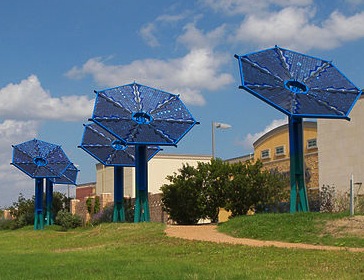
Solar array at Mueller, an "urban village" redevelopment project at the site of Austin's former municipal airport.
Renewable energy and the federal financial support it receives have been under mounting political attack (particularly from House Republicans) for months because of the reported troubles and eventual bankruptcy of the California-based solar-panel manufacturer Solyndra.
Even so, a pair of recent national polls – one by a solar trade organization and one by the University of Texas – indicate public favor for renewable energy remains strong.
The Solar Energy Industries Association announced Tuesday that its fourth annual opinion survey, conducted by an independent polling firm, found continuing support for solar power.
For instance, the pollsters found that 89 percent of respondents (down from 94 percent in 2010) said it was important “for the U.S. to develop and use solar power.” Ninety-four percent of self-identified Democrats agreed, along with 90 percent of Independents and 80 percent of Republicans.
One question regarding federal energy subsidies asked whether solar energy should receive support such as tax credits and grants that go to “traditional sources of energy.” Answering yes were 87 percent of Democrats, 82 percent of Independents and 71 percent of Republicans.
The UT Energy Poll, released in October, surveyed opinions on a much broader range of issues. Developed by the McCombs School of Business’ Energy Management and Innovation Center, it was the first of a promised series of biannual surveys on energy.
Asked about their relative satisfaction with the way that various groups (and President Barack Obama) are addressing “important energy issues,” respondents gave their highest marks among energy producers to wind and solar companies.
In each case, 36 percent said they were satisfied with such businesses’ efforts. Twenty-four percent (for wind) and 26 percent (for solar) said they were dissatisfied.
By comparison, respondents voiced net dissatisfaction with nuclear and fossil-fuel companies’ performance.
Twenty-two percent said they were satisfied and 34 percent dissatisfied with nuclear companies. For coal companies, 20 percent said they were satisfied and 35 percent dissatisfied.
The most negative attitude toward energy producers was for oil and gas companies (combined into one category by the pollsters). Sixteen percent of respondents were satisfied with the way they’re addressing key energy issues, but 58 percent were dissatisfied.
Energy efficiency and renewable energy ranked high among respondents’ concerns in the UT poll. More than half of those taking part said they were concerned about these issues and subjects:
- 84 percent – U.S. consumption of oil from foreign sources
- 76 percent – U.S. progress in developing ways to use energy efficiently
- 76 percent – U.S. progress in developing renewable energy sources
- 73 percent – Portion of your household budget spent on energy
- 69 percent – U.S. consumption of fossil fuels
- 68 percent – Energy efficiency of your home
- 64 percent – Impact of U.S. oil and gas exploration on the environment
- 62 percent – Your consumption of electricity
- 58 percent – Your consumption of gasoline
In a question representing the perennial counterposing of economy and environment, the UT respondents gave only a slight nod to economic improvement, despite the persistently sluggish economic recovery.
Thirty-seven percent said they would assign top priority to “economic growth,” while 33 percent said their top priority was “avoiding permanent harm to the environment.” Twenty-nine percent were in the middle.
Both surveys were conducted after Solyndra officials announced Aug. 31 that the company was ceasing operations and filing for Chapter 11 bankruptcy protection.
The solar association’s poll was carried out between Sept. 29 and Oct. 6, while the UT survey involved questioning from Sept. 14–25.
UT said the design of its survey was “a collaborative effort of academics and polling experts, nongovernmental organizations, large energy users and energy producers.”
– Bill Dawson
